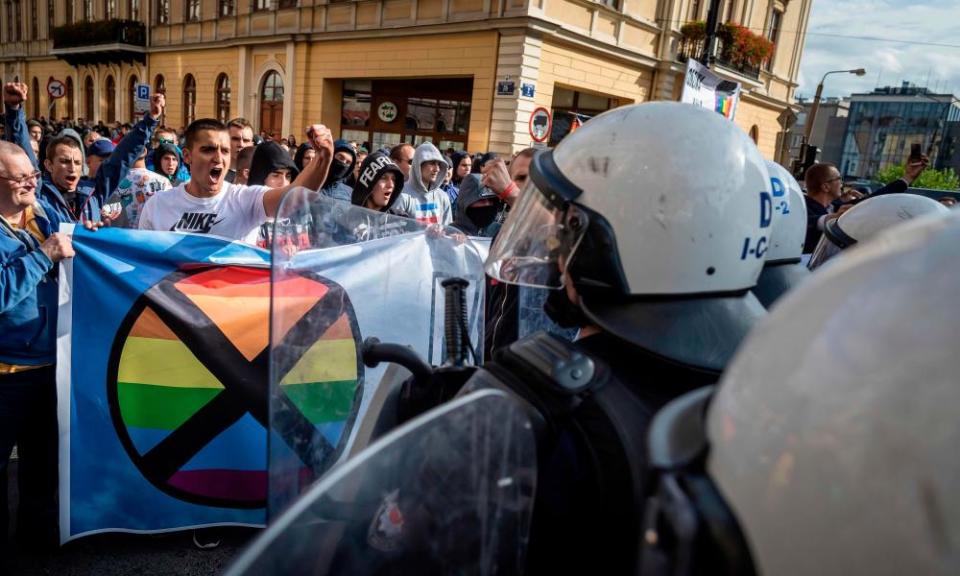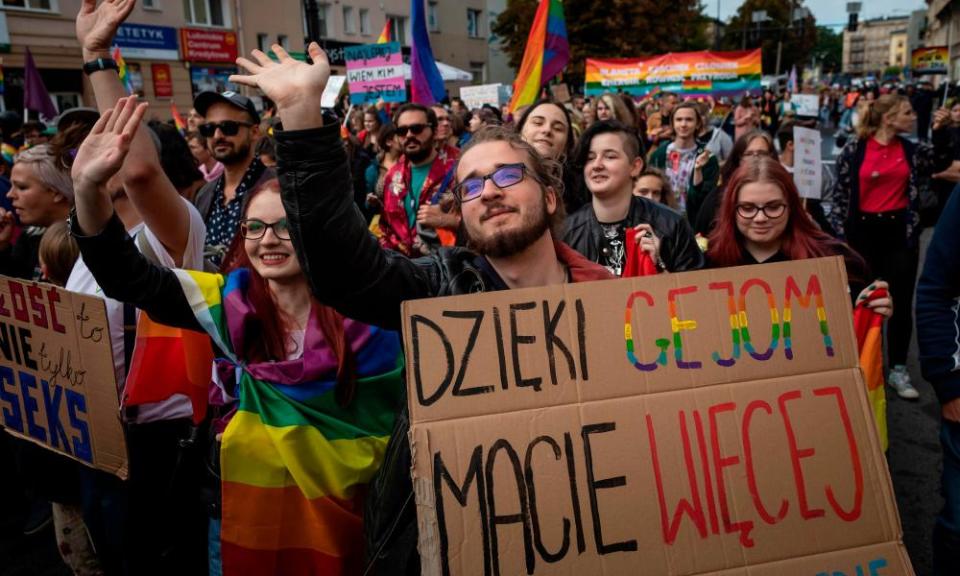Anti-LGBT rhetoric stokes tensions in eastern Europe

In a recent survey, Poles were asked to identify what they felt to be the biggest threats facing them in the 21st century, choosing from options such as the climate crisis, renewed aggression from Russia and a possible economic downturn.
Among men under 40, the most popular answer was “the LGBT movement and gender ideology”. The survey, conducted by Ipsos for the Polish website OKO.press, suggested that a government campaign against the nebulous concept of “LGBT ideology” was having an impact.
In Poland, and elsewhere in central Europe, there has been a notable rise in tolerance and empathy towards the LGBT community in recent years, illustrated by the emergence of a confident new generation of activists in smaller towns and cities. But across the region, populist politicians and church leaders are using the issue to mobilise their conservative bases.
On Thursday, the continent’s biggest annual gathering of LGBT activists was told that the iron curtain that once divided Europe between communist east and capitalist west remained intact for gay and transgender people, amid a rising tide of homophobic hatred, violence and discrimination.
Adéla Horáková, an advocacy director at the Czech group We Are Fair, said that 30 years after the end of communism, former eastern bloc countries still lagged behind their western European counterparts in granting fair and equal treatment to members of the LGBT community.
“The iron curtain … still stands,” Horáková said at the opening of the three-day ILGA conference in Prague. “While life for them isn’t perfect on either side of the [former] curtain, in none of the eastern European countries can they get married, in none of them can same-sex couples jointly adopt children.”
That message will resonate with activists in Poland, where senior members of the ruling right-wing Law and Justice party (PiS) have engaged in an increasingly ferocious campaign portraying so-called “LGBT ideology” as a menace akin to that of Soviet-imposed communism. In the run-up to parliamentary elections this month, which PiS narrowly won, the “LGBT issue” emerged as one of the main campaign grounds.
Zbigniew Nosowski, the editor-in-chief of Więź, a relatively liberal Catholic quarterly in Warsaw, said the tactic was seen to have worked in May’s European elections. “They provoked people who were usually passive in the elections to come to the polls and vote, because they perceived the threat from supposed LGBT and gender ideology with anxiety,” he said.

Before the May elections, the PiS leader, Jarosław Kaczyński, told a gathering of lay Catholics in the central city of Włocławek that “these ideologies, philosophies, all of this is imported, these are not internal Polish mechanisms. They are a threat to Polish identity, to our nation, to its existence and thus to the Polish state.”
Since then, the rhetoric has only escalated. Kaczyński insinuated that homosexual couples wanted the right to adopt children out of a desire for sexual gratification. The archbishop of Kraków, Marek Jędraszewski, referred to the perceived threat from gay rights campaigners as a “rainbow plague”, comparing it to Nazism and Soviet communism, in a sermon to mark the 75th anniversary of the Warsaw Uprising.
“He didn’t call the people a plague, he called the ideology a plague,” said archbishop Stanisław Gądecki, the head of the Polish episcopate, in an interview in Warsaw in September, claiming it was akin to attacking communism while respecting individual people who were communists.
In Hungary, where the church is less powerful than in Poland, there is less deep-rooted homophobia. Budapest was one of the first cities in the region to have pride marches. But in recent months the ruling Fidesz party of the far-right prime minister, Viktor Orbán, has begun what appears to be a coordinated homophobic campaign.
A Fidesz MP called for a boycott of Coca-Cola after the brand ran an advertising campaign featuring a gay couple, while the speaker of the Hungarian parliament, László Kövér, a close Orbán ally, has made a series of homophobic comments. “Morally, there is no difference between the behaviour of a paedophile and the behaviour of someone who demands such things,” he said when talking about gay marriage and adoption.

The LGBT community could provide a useful new target for Orbán after several years of relentless messaging about the dangers of migration from the Middle East and Africa.
“One of the main basics of the politics of Fidesz is to provide a common enemy for the Hungarians,” said Ádám András Kanicsár, a Hungarian journalist and LGBT activist. “These enemies were immigrants, then came Brussels and the EU, and then George Soros. But all of these enemies got boring for the audience, so they always have to find a new one. And the new ones are the LGBTQ people and rainbow families who are, according to Fidesz, dangerous to classical Catholic values and the Hungarian families.”
In the Czech Republic, attitudes are even more progressive, with a recent survey showing 61% of people supported a bill currently under consideration that would legally enshrine gay marriage. But here too, conservative politicians are rallying part of their base with homophobic rhetoric disguised as a promotion of “traditional values”.
Partly as a result, the bill has become ensnared in the chamber of deputies, the Czech parliament’s lower house, at the first reading stage. Attempts to give it a second reading have been repeatedly blocked, despite it having the public backing of Andrej Babiš, the prime minister.
Critics point out that Babiš has declined to use his authority to instruct MPs from his ANO party to vote for the bill and has sent out mixed signals by recently meeting with the rightwing group Movement for Life, which aims to increase birth rates and has been associated with homophobic stances.
Opponents have tabled a counter-proposal to bring the Czech constitution into line with laws passed in Hungary and Slovakia that would explicitly define marriage as between a man and a woman. It is unlikely to pass but has received support from church figures and from Miloš Zeman, the populist Czech president, who has said he would veto any legislation legalising gay marriage.
Related: 50 years after Stonewall: Yuval Noah Harari on the new threats to LGBT rights
Across the region, the rhetoric has had an impact. A University of Warsaw study last year found more than two-thirds of people identifying as LGBTI in Poland had endured psychological or physical violence, and 70% of teenagers identifying as LGBTI had had suicidal thoughts. At a recent equality parade in the eastern Polish city of Białystok, far-right thugs physically assaulted participants after the event was publicly denounced by the local archbishop.
The increased homophobia has prompted solidarity and fightback among the LGBT community and more liberal-minded central Europeans. In Poland, a #jestemLGBT (I am LGBT) online campaign was launched on Twitter this year, with thousands of people celebrating their sexuality, coming out or simply showing their support.
In Hungary, parts of the LGBT community feel the new messaging requires a strong response. “The horrible homophobic communication somehow has woken up the community and made them realise that now they now have to fight for their rights,” said Kanicsár.
Additional reporting by Flora Garamvolgyi

 Yahoo News
Yahoo News 